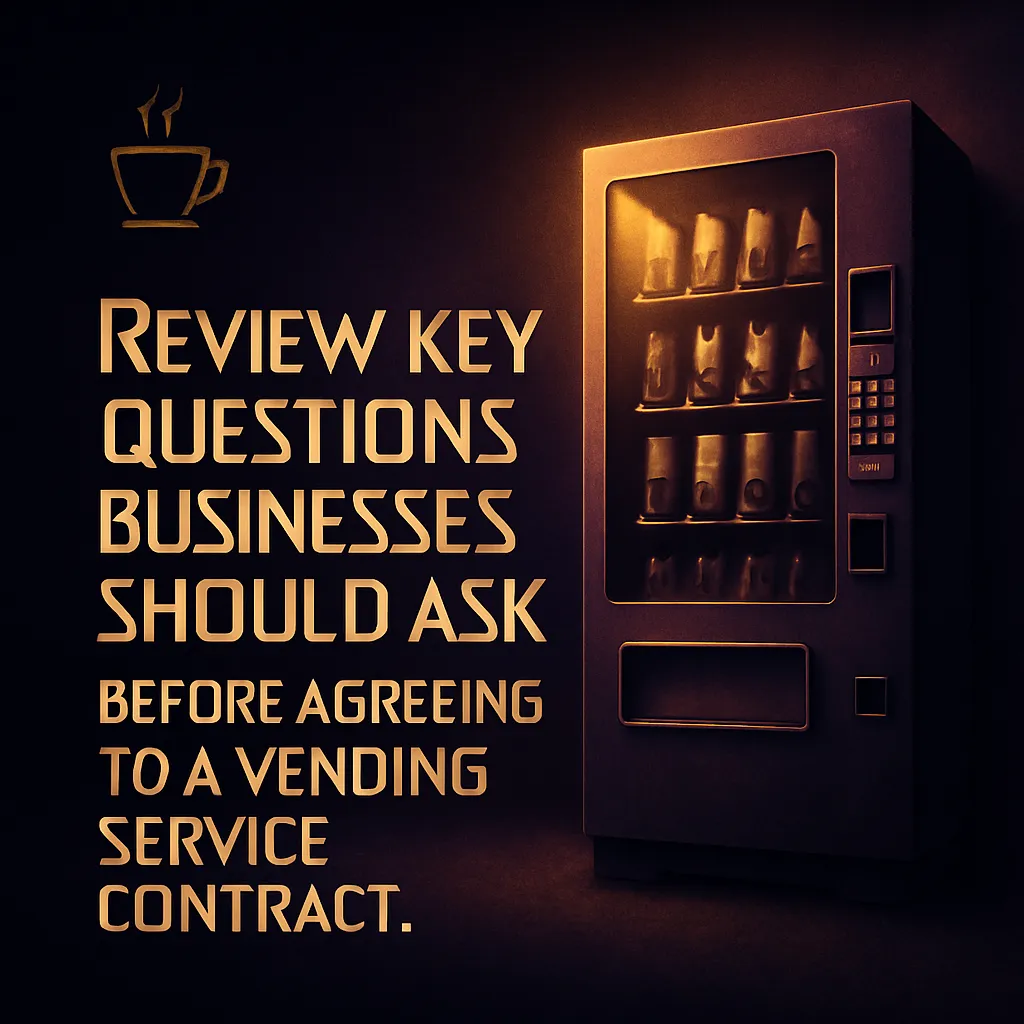Questions to Ask Before Signing a Vending Contract
Review key questions businesses should ask before agreeing to a vending service contract.
Back to Vending Contracts ResourcesReview key questions businesses should ask before agreeing to a vending service contract.
Back to Vending Contracts ResourcesSigning a vending contract can seem straightforward, but understanding the fine print ensures a partnership that truly benefits your business and its employees.
![]() Clarify contract length and termination clauses
Clarify contract length and termination clauses
![]() Understand commission structures and payment terms
Understand commission structures and payment terms
![]() Confirm service expectations, maintenance, and restocking schedules
Confirm service expectations, maintenance, and restocking schedules

Entering into a vending machine contract can bring great convenience to your business, offering on-site refreshments for employees and visitors. However, a well-informed decision requires careful review of the terms and conditions. Before committing, consider a comprehensive list of questions to ensure the agreement aligns perfectly with your business needs and expectations. Understanding the intricacies of these agreements can prevent future complications and foster a productive relationship.
The core of any vending arrangement lies in its contract. It's crucial to clarify the contract duration – will it be a flexible one-year term or a longer commitment? What are the conditions for early termination of vending contracts, and are there any penalties involved? Pay close attention to clauses related to service frequency, maintenance, and restocking. A good contract defines clear expectations for when machines will be serviced and how quickly issues like malfunctions will be addressed. Understanding what is included in vending management service level agreements can shed light on these details.
One of the most common inquiries should revolve around the financial aspects. How is revenue sharing structured? Is it a percentage of gross sales, net sales, or a fixed fee? Transparency around these figures is vital. Beyond revenue, confirm who bears the costs for utilities, especially electricity, which vending machines consume. It's also important to understand specific aspects such as commissions in vending contracts and what they entail for your bottom line. Additionally, discuss product selection – can you request specific items or healthy alternatives? Knowing these operational details upfront avoids misunderstandings down the line.
An exclusivity clause is a common feature in vending contracts, stipulating that only one provider can operate machines on your premises. Weigh the pros and cons of such a clause. While it simplifies management, it can limit future options. Equally important is clarifying liability. What happens if a machine malfunctions and causes damage or injury? The contract should clearly outline insurance coverage and responsibilities. For detailed insights into these clauses, explore common clauses in vending contracts. Being proactive about these questions will ensure you sign a contract that maximizes benefits while minimizing risks for your business.
Vending Exchange can help you find partners who align with your contract requirements. Fill out the form to get started.
Aim for a contract length that provides flexibility, usually one to three years, to allow for adjustments if needs change. Avoid excessively long terms unless there's a strong benefit.
Commission structures can vary. Clarify if it's a percentage of gross sales, net sales, or a fixed monthly amount. Understand when and how payments are made.
The contract should explicitly detail response times for repairs, restocking schedules, and who is responsible for cleaning and general upkeep of the machines.
Discuss product customization options. Some contracts allow for tailored selections, including healthy choices, local products, or specific brands that cater to your business's clientele.
Understand the conditions under which either party can terminate the contract, including notice periods, penalties, or reasons for early termination.
Clarify utility costs. Typically, the business hosting the machine provides electricity, but this should be clearly stated in the agreement to avoid surprises.
Inquire about all potential fees, including installation, removal, administrative charges, or late payment fees. Ensure complete transparency.
The contract should outline liability for damage to property or injury caused by faulty equipment. Ensure the vending service carries adequate insurance.
An exclusivity clause prevents other vending providers from placing machines on your premises. Understand its implications and whether it aligns with your long-term goals.
The contract should specify the frequency of restocking visits and how inventory levels are monitored, especially for high-traffic locations. This ensures machines are always operational and well-supplied.